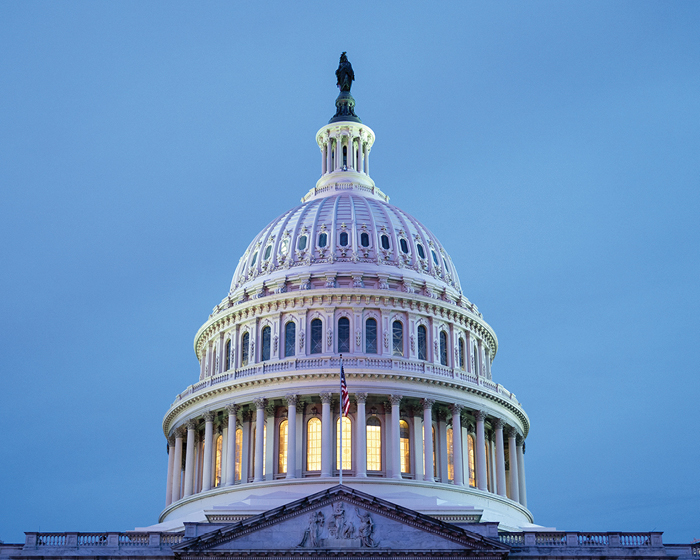Key Takeaways
- Both Republicans and Democrats say Trump's new tariffs are being used to pay for tax cuts, even if they disagree on the policy.
- The truth is more complicated, as tariffs won't count in an official budget estimate of legislation to extend the TCJA.
- But tariff revenue could help Republicans justify voting for a bill with a trillion-dollar price tag.
- The Senate is moving ahead on a budget resolution that nixes the House's steep spending cuts.
- Deficit hardliners like Rep. Chip Roy could be pivotal votes as this plays out.
Republicans wish they could focus on extending the 2017 Tax Cuts and Jobs Act. The December 31 expiration date for many of the TCJA's provisions is fast approaching. But this week in Washington, with “Liberation Day,” it was hard to ignore the sweeping tariffs announced by the Trump administration.
The two issues are connected, though. Both Republicans and Democrats have claimed that one of the tariff's goals is to raise revenue to pay for GOP priorities, including tax cuts.
"Now it’s our turn to prosper, and in so doing, use trillions and trillions of dollars to reduce our taxes and pay down our national debt," President Trump said before signing the tariff executive order.
Senate Minority Leader Chuck Schumer, D-N.Y., sort of agrees that this is the goal, although he puts it in starkly different terms.
"This is a huge tax on American families, all to help billionaires get a tax cut," he said.
The actual connection, though, is less direct than either side might like to imply.
As Republican lawmakers and staffers work on constructing a tax-and-spending package, they're scouring the tax code for any potential sources of revenue to offset the huge expected costs of a TCJA extension. This is necessary because of the reconciliation rules, with parameters set by a to-be-finalized budget resolution.
The Joint Committee on Taxation and Congressional Budget Office typically act as the scorekeepers here, determining the cost of the bill which would then be used to see if lawmakers are following their self-imposed rules. Short of an outright demand from Congress, both of those offices are very unlikely to include tariff windfalls in the score. President Trump imposed these tariffs using authority granted to him through existing laws, so there's no reason to include them in an estimate of new legislation. (Even if they did, the budget experts would probably be less optimistic about how much new revenue they'd bring in, especially when accounting for the effects on the economy.)
So legally, there's no connection. But in terms of politics, it's a different matter.
Even when factoring in significant mandated spending cuts (or a current policy baseline that doesn't include the actual cost of an extension), both of the resolutions supported by the House and the Senate include hefty price tags of trillions of dollars in increased national debt. Lawmakers can vote for that but they’ll have to be able to explain it, and many have already claimed that a tariff windfall and economic growth can cover it.
Republicans used a similar tactic – rhetorical scoring, in a sense – for the 2017 Tax Cuts and Jobs Act, which officially had a $1.5 trillion price tag, but which lawmakers said would ultimately pay for itself.
Of course, by taking credit for the tariff windfalls, Republicans may also have to claim ownership of other effects, which could be very difficult to predict.
Speaking of reconciliation...
Speaking of reconciliation, the Senate swung into gear this week, pushing forward a new budget resolution with major alterations to the one passed by the House in February. This resolution calls for only minimal spending cuts, and uses a current policy baseline which reduces its sticker price. With support from Trump and only Sen. Rand Paul, R-Ky., objecting so far, it looks poised to pass. But it will likely face a tough audience in the House, where many Republicans have voiced skepticism about current policy accounting, and have demanded steep cuts to offset an extension’s cost. Once both chambers have passed their resolutions, it will likely come down to a negotiation, balancing Republicans' desire to make the TCJA fully permanent and their tolerance for potentially difficult spending cuts. Ultimately, to continue the reconciliation process which Republicans hope to use to pass final legislation, both chambers must pass the same budget resolution outlining their revenue and spending plans.
There's another potential speed bump, though. A new Joint Committee on Taxation report estimates that a TCJA extension could cost as much as $5.5 trillion over 10 years, more than had been previously estimated.
Other Items of Note
INTERVIEW: Trump’s Tax Cuts Hinge on GOP Lawmakers Like Chip Roy – Richard Rubin, The Wall Street Journal ($):
The Texas lawmaker is leading the drive to attach spending cuts to President Trump’s tax cuts. Roy’s push got a fiscal framework through the narrowly divided House, but that was only the first step in the process of writing the “one big, beautiful bill” that will carry Trump’s agenda. And collisions within the House GOP and between the House and Senate are on the horizon.
Republicans Plan to Skirt Senate Rules to Push Through More Tax Cuts – Catie Edmondson, The New York Times ($):
Budget experts of all stripes howl about Senate Republicans’ price tag ‘abuse’ – Jennifer Scholtes, Politico
The Tax Angle: Dems Prep For Tax Debate; CBO Eyes Deficits – Stephen Cooper, Law360 Tax Authority ($)
Tax Writers Are Forced Into Tough Choices as Budget Plan Forms – Zach Cohen and Chris Cioffi, Bloomberg Tax ($)
That limit will force lawmakers into hard conversations and potentially make a suite of concessions—including which new tax cuts are included and for how long, and which sector of the economy sees hikes to offset those bespoke benefits.
We're Here to Help


